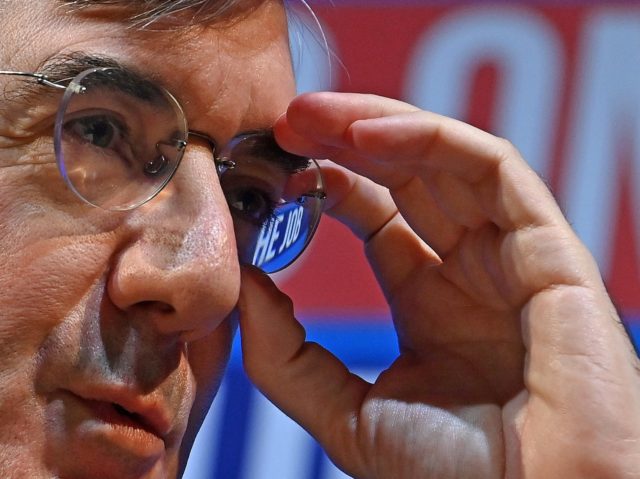The British government has indicated that it may finally scrap the Northern Ireland protocol — which leaves the European Union in control of much trade and regulatory policy in the province — with or without the EU’s agreement.
“We’ve been making that very clear to them, if in the end they refuse to move, if they’re not willing to act in good faith, then we will have to do things for ourselves,” said Jacob Rees-Mogg MP, the Minister for Brexit Opportunities and Government Efficiency in the Boris Johnson administration, of the British government’s stance on the so-called Northern Ireland Protocol, in comments to GB News. ‘
“We can’t accept disruption within the United Kingdom,” he said, referring to the way the protocol has seen the EU impose a customs border in the Irish Sea between Great Britain and Northern Ireland — integral parts of the United Kingdom of Great Britain and Northern Ireland, as its name would suggest — to the distress of British Unionists in the province and people who do business across the Irish Sea.
“I think it [the EU] wants to make [the UK] feel bad for having left the European Union, that underpins its whole policy [on Northern Ireland], and it doesn’t really mind about the consequences of that,” Rees-Mogg continued, indicating in no uncertain terms that he believes the EU’s refusal to meaningfully change the operation of the protocol stems from eurocrats’ desire to make an example of Britain as punishment for Brexit.
French president Emmanuel Macron’s prime minister, Jean Castex, suggested in late 2021 that it was important to “make clear to European public opinion that… leaving the [European] Union is more damaging than remaining in it,” leaving Britons in little doubt that key players within the EU have no intention of dealing with the UK in good faith now it has gone its own way.
“[W]e’re an independent country, and what the EU wants or thinks is secondary,” Rees-Mogg said, noting that starting a trade war with Britain for scrapping the Northern Ireland Protocol would not be in the interests of European citizens during an inflationary crisis but that, at the end of the day, the British government cannot control whether it decides to self-harm in order to save face.
“We can’t tell the EU what to do, we have to have an idea of what it may do, and it may decide it wants an act of self-harm, that is not under our control… we have to govern in our own interests, not constantly dance to what the EU thinks or does,” he insisted.
"Boris Johnson needs to be reminded that Northern Ireland is his job, Ukraine isn't", commented @bowgroup chairman Benjamin Harris-Quinney https://t.co/h58sniOGNK
— Breitbart London (@BreitbartLondon) March 6, 2022
The tough talk on Northern Ireland from not only Rees-Mogg, a former Leave campaigner and longtime eurosceptic, but also Foreign Secretary Truss may come as something of a surprise to Brexit watchers, given her background.
Truss, once a member of the EU loyalist Liberal Democrats party and an ardent Remain campaigner and key lieutenant of Remain campaign “scaremonger-in-chief” George Osborne at the Treasury in 2016, seems an unlikely figure to harden Britain’s stance towards an increasingly uncompromising Brussels, particularly given she supported the Brexit-in-name-only exit deal proposed by Prime Minister Johnson’s predecessor Theresa May, which entailed somewhat worse terms than those he ended up accepting.
Nevertheless, she was reportedly set to give eurocrats 72 hours to agree to change the punishing way the Northern Ireland Protocol has been implemented — with EU-mandated checks on trade between Great Britain and Northern Ireland accounting for a grossly disproportionate share of all checks carries out by the bloc, despite its sharing borders with the likes of Russia, Belarus, and Morocco — or face unilateral action by the British to overturn the status quo.
The Johnson administration has form for setting deadlines and indulging in hardline rhetoric against the EU before folding at the last minute, however — as with the Brexit deal it is now complaining about, for example.
This was agreed on Christmas Eve on the cusp of a no-deal break with the bloc, and required Britain to submit to the Protocol, pay a multi-billion pound “divorce” settlement to Brussels, allow EU trawlers to continue plundering British fisheries at local fishermens’ expense, agree to remain subject to the European Court of Human Rights, and let the EU cut out British territories such as Gibraltar and the Falkland Islands from the agreement.
The EU appeared to concede on almost nothing in exchange, beyond agreeing to maintain free trade in goods, where the EU enjoys a massive trade surplus over Britain. Free trade in services, where the trade advantage is Britain’s, was not covered in the same way.
Masked Ulster Loyalists Board and Set Fire to Public Bus over EU Sellout https://t.co/pGIRiSW18l
— Breitbart London (@BreitbartLondon) November 1, 2021

COMMENTS
Please let us know if you're having issues with commenting.